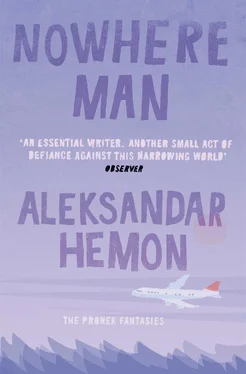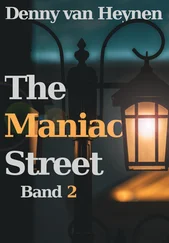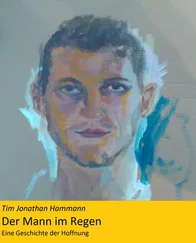In the spring of 1944, Pick is awakened from his nap by the stirring of a mouse and emerges from his nightmare with a claustrophobic uneasiness and a tingling in his heart, which he recognizes as foreshadowing evil times. He screams at the cowering Cathay Hotel staff, storms down Nanking Road in his black pajamas, like a devil apparition, and charges into Commander Otani’s office, requesting, before even sitting down, to be sent off to another place, far from this stinking pit of hell. Commander Otani puts his hand on Pick’s shoulder, then strokes his cheek, until Pick calms down.
In the summer of 1944, Captain Pick goes to the Philippines. He arrives under the name of Koji, followed by his usual entourage, reinforced by the playboy boxer Mihalka; a Portuguese black marketeer Francisco Carneiro (Mihalka’s manager); and an Italian lawyer and chemist, Dr. Vincente, capable of concocting all kinds of joys. Pick’s orchestra does little, almost nothing, in Manila. They help catch and kill a Danish gunrunner. They set a trap for Father Kirkpatrick, an Irish priest, suspected of smuggling food and medicine to American internees — one source claims that it is Pick himself who oversees Father Kirkpatrick’s crucifixion. They intercept U.S. naval intelligence talking about imminent attacks all around the Pacific. The information is rejected by the Japanese as “dangerous thoughts,” whereupon Pick’s men use the equipment solely to record the American hit parade. American music is played at their parties, which instantly become all the rage among the idle Manila elite and prostitutes bored with the never-changing clientele.
But other than those few little jobs and parties, Captain Pick and his crew spend time racketeering, setting up a little, classy and expensive prostitution ring, and hanging out in nightclubs. Pick’s favorite haunt is the Gastronome, because the jukebox there has a record of him singing “Tea for Two” in English, though in the manner of a poignant Russian ballad, a rendition made all the more convincing by his atrocious Russian accent. The B-side of the record contains “Do Not Close Your Eyes, Mother Russia,” sung, as it well should be, heartbreakingly.
At the end of the summer, Pick gets uneasy again and returns to Shanghai, complaining of ill health, and taking the entire budget of the Manila operation with him. It was on the ship to Shanghai, with the Pacific winds in his face, that the uneasiness crystallizes into a sense of something coming to an end, into a painful, tormenting anticipation of a future loss.
Indeed, everybody can smell the end, and it has the smell of burning flesh — Tokyo has been leveled, Hiroshima annihilated. On August 9, between the bombs, Evgenij Pick has his last supper with Commander Otani at his home, room 741 at the Cathay. They eat a magnificently prepared yellow croaker, washed down by superbly aged sake, saved by Otani for a special occasion. Having kissed Otani on both cheeks, Pick goes to join the farewell orgy at the Yar restaurant, arranged by a posse of girls known as Mihalka’s Harem (Mihalka is still stuck in Manila). Pick complains to the girls, who could not care less in their opiatic daze, that he has reason to believe that the Japanese plan to kill him. Thus no one, apart from Otani, notices when he disappears from Shanghai the next day.
In the fall of 1945, Wasserstein notes, the American authorities in China fruitlessly search for Pick. He is seen in a barbershop in Shanghai; he is seen on a train to Beijing, telling the interested co-passengers how he cut off the head of a Japanese officer trying to rape a Chinese girl, and then had to spend a year behind the double wall of a magician’s trunk; he is seen praying in a Russian Orthodox Church in Beijing; he is seen performing a Hamlet monologue, delivering “To be or not to be. .” with a strange, untraceable accent, in front of an audience of American missionaries, who do not recognize the song he sings at the end.
Pick, in fact, takes a boat to Japan, which then hits a mine. Everyone on the boat dies, except Pick, who is miraculously found floating unconscious but alive, surrounded by a school of corpses and body parts. Pick goes to Tokyo, straight to the navy ministry, on crutches — his leg mauled — and finds Commander Otani, who transfers one million yen to Pick under the name of Koji, beseeching him to open a Russian theater in Tokyo and not to neglect his considerable thespian talents. Pick waits for the right moment to start the theater (for which he already has the name: the New World Theatre), but spends all his money waiting. And with the astute instinct of a veteran survivor he can sense that the American hounds are on his scent.
Hence in February 1946, he walks, limping dramatically into an American intelligence headquarters and offers to tell them the truth. He consequently delivers to his involved listeners (a Captain Aaron and a Major Maxwell) a cycle of interlocking stories, from the beginning of his life to this day: he tells them about escaping the Germans; about giving information to the British: about subverting Japanese intelligence operations in Shanghai: about his mother, who was an American, and who could be living in America today with her new husband. He tells them that he was the one who tipped off the Japanese about the Sorge spy ring, having remembered him as the Comintern colleague. He slaps his crippled leg, exhibiting it as a result of Japanese torture, and rolls a couple of nacreous tears down his sunken cheeks. He tells the Americans that his motive for going to Japan was to share with them all he knew, and to see the Japanese beasts suffering in defeat. He tells them everything he knows about every Japanese officer he ever met. He tells them everything he knows about Otani, the disgusting, opium-addicted sodomite, and about Otani’s liking for torturing prisoners.
The American intelligence officers are very happy with the quality of information coming from Pick. Everything makes a lot of sense, unverifiable though it may be, and they forgive and release Pick, in return for future cooperation. He goes back to Shanghai and attempts to restore his network to serve the Americans, but to no avail — Shanghai is not the same, and it never will be. Captain Pick swallows his loss with glass after glass of vodka; he eschews looking into the dark future by looking only as far as the next opium dose. Before the People’s Liberation Army enters Shanghai in 1949, he flees it. In the spring of 1950. he is in possession of an entry visa to Siam. In the summer of 1950, he is in a prison in Taiwan, where he entertains his fellow prisoners with stories told in broken Shanghai dialect about the wild thirties, singing the songs popular once upon a time, all in return for sexual favors and cigarettes. Then he disappears.
There are few photos of Pick. One of them is a police photo: a balding man, crowned by the remnants of his gray hair; a square, violent jaw; a triangular nose; a pointed Adam’s apple; glaring manic eyes. Another one is a publicity photograph from the Far Eastern Grand Opera days: he wears a top hat and a black cape, like a magician; there is an elegant white scarf casually thrown over his shoulder; in his gloved left hand he holds the other glove; in his right hand he holds a cigarette, with the ashes about to fall off. His face is heavily made up: thick, penciled eyebrows; glittering pomade; rouged lips. He glances at you sideways, as if about to turn to you full face and begin mesmerizing you. And you have to turn your gaze away, but you simply cannot.
In the summer of 2000, my wife and I went to Shanghai for our honeymoon, because that was where her grandparents met (her parents unromantically met in a Chicago bar called Jimmy’s). We’d saved enough money from our teaching and took a leave from Ort Institute. We’d promised all our students we would send them postcards and we’d let Marcus teach us a few phrases in the Shanghai dialect. We were in love and spent the flight holding hands and reading — she read The Idiot , and I read Wasserstein’s Secret War in Shanghai , occasionally kissing her lean neck. We stayed at the Peace Hotel, which used to be the Cathay, and we liked it — they changed our towels regularly, the staff who could speak English always asked us how we were, and we would tell them, for they seemed to care. Pretty soon, we started referring to our hotel room, room 741, as our home. We loved Shanghai, went walking everywhere, despite the incredible heat, wiping sweat off each other’s bodies upon returning to our room, and then making love. We bought cheap silk, authentic souvenirs, and Mao posters we knew our lefty, ironical friends would like. We walked the Bund and went to museums. We roamed the Old Chinese Town, fueled by the belief that we were getting the real China for very few dollars. In Sun Yat-sen’s former residence in the former French Concession, we looked at a saber on the wall, the map of China, and a silk painting of a cat (the guide said: “Please, look at the cat’s eyes — they follow you everywhere in the room”). We ate at restaurants in old Western buildings, including a French restaurant in an old Russian Orthodox church, the dome pressing down on us with all the might of an unfriendly Slavic God. We went to Suzhou for a day to look at the magnificent gardens. We rented jalopy bikes, and rode from garden to garden, taking a break only to succumb to a craving for Kentucky Fried Chicken.
Читать дальше












